The Milk Sterilizer Machine Market is estimated to be valued at USD 2.6 billion in 2025 and is projected to reach USD 5.9 billion by 2035, registering a compound annual growth rate (CAGR) of 8.4% over the forecast period.
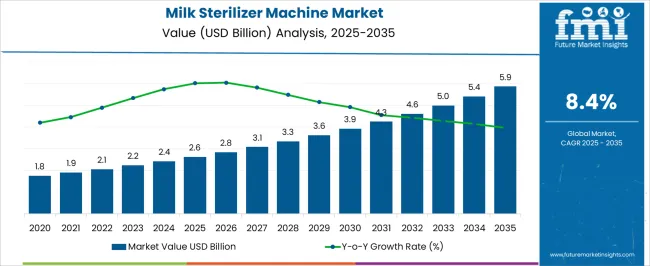
| Metric | Value |
|---|---|
| Milk Sterilizer Machine Market Estimated Value in (2025 E) | USD 2.6 billion |
| Milk Sterilizer Machine Market Forecast Value in (2035 F) | USD 5.9 billion |
| Forecast CAGR (2025 to 2035) | 8.4% |
The milk sterilizer machine market is experiencing notable growth as dairy processors increasingly prioritize food safety, extended shelf life, and regulatory compliance. Rising consumer demand for hygienically processed and longer-lasting milk products has influenced manufacturers to invest in advanced sterilization technologies.
Industry developments indicate that operational efficiency, product quality enhancement, and sustainability concerns are driving the adoption of energy-efficient and high-capacity machines. Future expansion is expected to be supported by modernization of dairy processing facilities, technological innovations in sterilization methods, and government initiatives promoting food safety standards.
Ongoing emphasis on reducing operational costs and minimizing product wastage is paving the path for broader adoption across both developed and emerging markets.
The market is segmented by Method, Capacity, Product, Automation Grade, and Distribution Channel and region. By Method, the market is divided into Continuous and Batch-Wise. In terms of Capacity, the market is classified into 1000-5000 litres/hour, 0-100 litres/hour, 100-1000 litres/hour, 5000-10000 litres/hour, and Over 10000 litres/hour. Based on Product, the market is segmented into Ultra High Temperature (UHT), High-Temperature Short Time (HTST), Higher Heat Shorter Time (HHST), and Ultra Pasteurized (UP). By Automation Grade, the market is divided into Fully Automatic and Semi-Automatic. By Distribution Channel, the market is segmented into Supermarket, E-commerce, and Specialized Tool Store. Regionally, the market is classified into North America, Latin America, Western Europe, Eastern Europe, Balkan & Baltic Countries, Russia & Belarus, Central Asia, East Asia, South Asia & Pacific, and the Middle East & Africa.
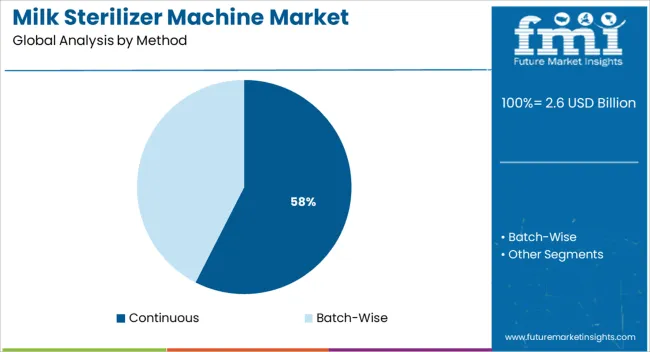
When segmented by method, the continuous method is projected to account for 57.5% of the market revenue in 2025, making it the leading method segment. This leadership is attributed to the method’s superior efficiency, consistent product quality, and suitability for large-scale operations.
Continuous systems have been adopted widely as they enable uninterrupted processing, which minimizes downtime and ensures uniform sterilization, meeting the stringent hygiene requirements of the dairy industry. Their ability to handle higher volumes with reduced energy consumption and lower labor intervention has further solidified their position.
Technological advancements enhancing temperature control and automation within continuous systems have improved productivity, reinforcing the preference for this method in high-throughput facilities.
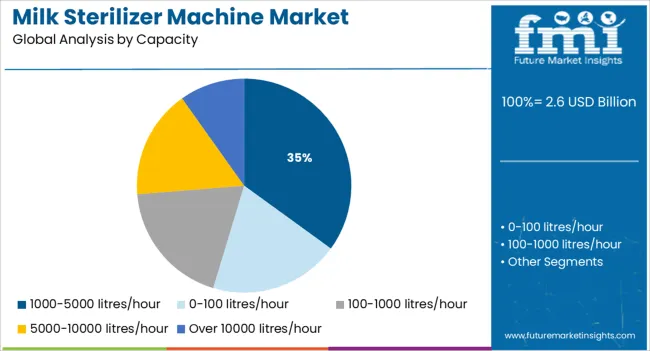
Segmented by capacity, machines with a processing capability of 1000 to 5000 litres per hour are expected to hold 35.0% of the market revenue in 2025, establishing themselves as the dominant capacity segment. This prominence is supported by the balance these machines offer between output efficiency and operational flexibility, which suits medium to large dairy operations.
Facilities have favored this capacity range as it aligns with both urban and regional distribution needs without imposing excessive energy or maintenance costs. The segment’s growth has also been supported by its ability to serve diverse product lines while maintaining compliance with evolving food safety regulations.
The ability to integrate seamlessly with upstream and downstream processing equipment has further strengthened the adoption of this capacity range.
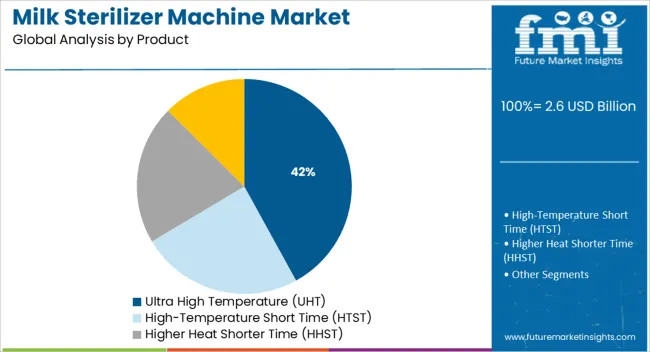
When segmented by product, ultra high temperature UHT sterilizer machines are forecast to capture 42.0% of the market revenue in 2025, making them the leading product segment. This leadership is driven by the increasing demand for milk products with extended shelf life and the growing preference for aseptic packaging.
UHT machines have been widely adopted as they enable processing at temperatures high enough to ensure microbial destruction while preserving nutritional quality and taste. Their ability to deliver shelf-stable products without refrigeration has proven advantageous for both manufacturers and retailers seeking to expand distribution reach.
The segment’s growth has been reinforced by operational savings from reduced cold chain dependency and the increasing appeal of convenient, long-life dairy products among consumers.
The global sales of milk sterilizer machines are projected to rise at 8.4% CAGR between 2025 and 2035, in comparison to the 6.2% CAGR registered during the historical period of 2020 to 2025.
Increasing the adoption of milk sterilizer machines for eliminating pathogens from raw milk to extend its shelf life is a key factor driving the global milk sterilizer machine market.
Similarly, the growing usage of sterilized milk across various industries such as bakeries, dietary supplements, and confectionery is expected to push the demand for milk sterilizer machines during the forecast period.
In addition to this, advancements in sterilization equipment and growing awareness about the benefits of consuming sterilized milk will create growth prospects within the global milk sterilizer machine market over the next ten years.
Rising Consumer Demand for Safe and Healthy Food Products to Boost Milk Sterilizer Machine Market
With the rising prevalence of foodborne disease across the world, demand for safe and healthy food products has skyrocketed during the last few years and the trend is likely to continue during the forecast period.
People are rapidly shifting their preference toward high-quality products that are free from pathogens. This is encouraging manufacturing companies to use advanced machinery like sterilization equipment which will eventually boost the global milk sterilizer machine market during the projected period.
Similarly, the introduction of various government initiatives aiming towards encouraging the consumption of safe and high-quality products will bode well for the market.
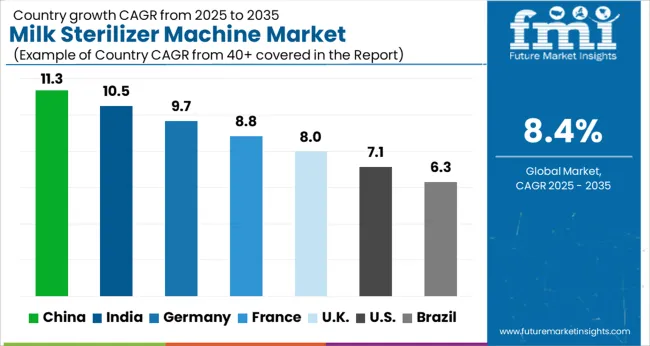
Rising Demand for Milk Products Driving Milk Sterilizer Machine Market in the USA
According to Future Market Insights, the USA milk sterilizer machine market is anticipated to reach a valuation of USD 2.6 Million in 2025 and it is poised to grow at a healthy pace during the next ten years.
Growth in the USA milk sterilizer machine market is driven by increased demand for milk products, high adoption of advanced technologies, and favorable government support.
Similarly, the rapid growth of industries like dietary supplements, bakeries, and confectionery is expected to push the demand for milk sterilizer machines in the USA during the forecast period.
Availability of Advanced Sterilization Equipment Pushing Demand in Germany
The milk sterilizer machine market size in Germany is expected to reach around USD 157 Million in 2025 owing to the increasing popularity of dairy products and the availability of advanced sterilization equipment.
In Europe, there are around 6000,000 dairy farms and over 12,000 processing plants. Most of these farms and processing plants are concentrated in countries like Germany and the UK Rising number of these dairy farms and processing plants will continue to propel the demand for milk sterilizer machines across Germany during the forecast period.
Cheese, ice cream products, and chocolate have long been a staple of the European diet, and the chocolate and cheese businesses are responding to this demand by increasing their production capacities. This is positively impacting the milk sterilizer machine market in the country.
Rising Need for Improving Shelf Life of Milk and Milk-based Products Propelling Sales in India
As per FMI, the milk sterilizer machine market in India is likely to surpass a valuation of USD 130 Million in 2025. Furthermore, due to manufacturers' increased concern about extending product shelf life through sterilization, the milk sterilizer machine market in India is predicted to grow at a robust pace during the projected period.
Similarly, increasing milk production, consumption, and processing along with the rapid expansion of milk-related sectors such as dietary supplements, cheese, chocolate, and other sweet confectionery is expected to generate demand for equipment like milk sterilizer machines across India.
Growing Focus Towards Reducing Human Intervention and Labor Costs Fuelling Demand for Fully Automatic Milk Sterilizer Machines
Based on automation grade, the global milk sterilizer machine market is segmented into semi-automatic and fully automatic. Among these, sales of fully automatic milk sterilizer machines are likely to outpace those of semi-automatic ones.
This can be attributed to the rising end-user preference for automatic machines to reduce human intervention, improve product safety and quality, and reduce labor costs. Moreover, advancements in automatic milk sterilizer machines will further boost the growth of the target segment during the forecast period.
Key players including GEA Group, SPX Flow Inc., Alfa Laval, and Krones AG are working on incorporating new technology into their product ranges as well as establishing new manufacturing facilities in developing countries.
SPX Flow Inc., for example, signed a deal with Primodan A/S in February 2024 to acquire equipment and technologies for yellow cheese production. Pressing and final bringing systems, as well as curd-making technologies, are among the new additions.
Similarly, with a large number of regional as well as local businesses, the market is highly fragmented and competitive. The market's major companies are distinguished by technical advancements that lower production costs while also articulating more established and high-quality products.
Additionally, leading players are adopting strategies such as strategic alliances, mergers, partnerships, and acquisitions to expand their global footprint. For instance,
| Attribute | Details |
|---|---|
| Estimated Market Size (2025) | USD 2.6 billion |
| Projected Market Size (2035) | USD 5.9 billion |
| Anticipated Growth Rate (2025 to 2035) | 8.4% CAGR |
| Forecast Period | 2025 to 2035 |
| Historical Data Available for | 2020 to 2025 |
| Market Analysis | USD Million for Value and Units for Volume |
| Key Regions Covered | North America; Latin America; Europe; South Asia; East Asia; Oceania; Middle East and Africa (MEA) |
| Key Countries Covered | USA, Canada, Mexico, Germany, UK, France, Italy, Spain, China, Japan, India, South Korea, Australia, Brazil, Argentina, South Africa, UAE |
| Key Segments Covered | Product, Method, Automation Grade, Distribution channel, Region |
| Key Companies Profiled | Dion Engineering; GEA Group; Krones; SPX Flow (APV); Tetra Pak International; ABL Technology; Della Toffola; INOXPA; HydroLock; SEPAK Industries.; REDA S.P.A.; Shanghai Jimei Food Machinery; TESSA I.E.C Group; Stephan Machinery Gmbh; GOMA Engineering |
| Report Coverage | Market Forecast, Company Share Analysis, Competitive Landscape, Drivers, Restraints, Opportunities and Threats Analysis, Market Dynamics and Challenges, and Strategic Growth Initiatives |
The global milk sterilizer machine market is estimated to be valued at USD 2.6 billion in 2025.
The market size for the milk sterilizer machine market is projected to reach USD 5.9 billion by 2035.
The milk sterilizer machine market is expected to grow at a 8.4% CAGR between 2025 and 2035.
The key product types in milk sterilizer machine market are continuous and batch-wise.
In terms of capacity, 1000-5000 litres/hour segment to command 35.0% share in the milk sterilizer machine market in 2025.






Our Research Products

The "Full Research Suite" delivers actionable market intel, deep dives on markets or technologies, so clients act faster, cut risk, and unlock growth.

The Leaderboard benchmarks and ranks top vendors, classifying them as Established Leaders, Leading Challengers, or Disruptors & Challengers.

Locates where complements amplify value and substitutes erode it, forecasting net impact by horizon

We deliver granular, decision-grade intel: market sizing, 5-year forecasts, pricing, adoption, usage, revenue, and operational KPIs—plus competitor tracking, regulation, and value chains—across 60 countries broadly.

Spot the shifts before they hit your P&L. We track inflection points, adoption curves, pricing moves, and ecosystem plays to show where demand is heading, why it is changing, and what to do next across high-growth markets and disruptive tech

Real-time reads of user behavior. We track shifting priorities, perceptions of today’s and next-gen services, and provider experience, then pace how fast tech moves from trial to adoption, blending buyer, consumer, and channel inputs with social signals (#WhySwitch, #UX).

Partner with our analyst team to build a custom report designed around your business priorities. From analysing market trends to assessing competitors or crafting bespoke datasets, we tailor insights to your needs.
Supplier Intelligence
Discovery & Profiling
Capacity & Footprint
Performance & Risk
Compliance & Governance
Commercial Readiness
Who Supplies Whom
Scorecards & Shortlists
Playbooks & Docs
Category Intelligence
Definition & Scope
Demand & Use Cases
Cost Drivers
Market Structure
Supply Chain Map
Trade & Policy
Operating Norms
Deliverables
Buyer Intelligence
Account Basics
Spend & Scope
Procurement Model
Vendor Requirements
Terms & Policies
Entry Strategy
Pain Points & Triggers
Outputs
Pricing Analysis
Benchmarks
Trends
Should-Cost
Indexation
Landed Cost
Commercial Terms
Deliverables
Brand Analysis
Positioning & Value Prop
Share & Presence
Customer Evidence
Go-to-Market
Digital & Reputation
Compliance & Trust
KPIs & Gaps
Outputs
Full Research Suite comprises of:
Market outlook & trends analysis
Interviews & case studies
Strategic recommendations
Vendor profiles & capabilities analysis
5-year forecasts
8 regions and 60+ country-level data splits
Market segment data splits
12 months of continuous data updates
DELIVERED AS:
PDF EXCEL ONLINE
Milk Froth Thermometer Market Size and Share Forecast Outlook 2025 to 2035
Milk Carton Market Size and Share Forecast Outlook 2025 to 2035
Milking Automation Market Size and Share Forecast Outlook 2025 to 2035
Milking Robots Market Size and Share Forecast Outlook 2025 to 2035
Milk Packaging Market Size and Share Forecast Outlook 2025 to 2035
Milk Clarifier Market Size and Share Forecast Outlook 2025 to 2035
Milk Powder Packaging Market Size and Share Forecast Outlook 2025 to 2035
Milk Protein Market - Size, Share, and Forecast 2025 to 2035
Milk Ingredients Market Analysis - Size, Share, and Forecast Outlook 2025 to 2035
Milk Mineral Concentrate Market Trends-Demand, Innovations & Forecast 2025 to 2035
Milk Thistle Market Analysis by Form, Distribution Channel and Region through 2035
Milk Powder Market Analysis by Type, Distribution Channel, Region and Other Applications Through 2035
Milk Tank Cooling System Market Growth – Trends & Forecast 2025 to 2035
Milk Alternatives Market – Growth, Demand & Dairy-Free Trends
Milk Protein Hydrolysate Market Growth - Infant Nutrition & Functional Use 2024 to 2034
Milking Equipment Market
Milk Bottle Market Trends & Industry Growth Forecast 2024-2034
Milk Fat Fractions Market
Milk Retentate Market
Milking Salve Market

Thank you!
You will receive an email from our Business Development Manager. Please be sure to check your SPAM/JUNK folder too.
Chat With
MaRIA